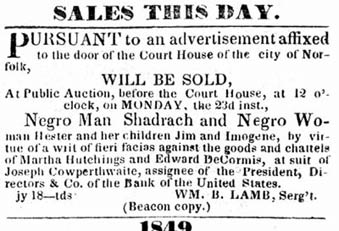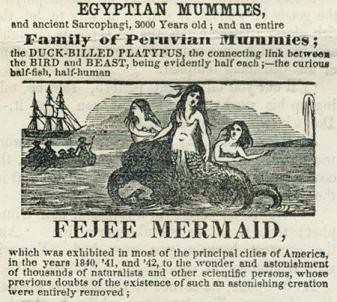Primary sources enable the researcher to get as close as possible to the truth of what actually happened during an historical event or time period. "Primary source" is a term used in a number of disciplines to describe source material that is closest to the person, information, period, or idea being studied. A primary source (also called "original source") is:
It serves as an original source of information about the topic. Similar definitions are used in library science, and other areas of scholarship. In journalism, a primary source can be a person with direct knowledge of a situation, or a document created by such a person. Primary sources are distinguished from secondary sources which cite, comment on, or build upon primary sources, though the distinction is not a sharp one.

Shadrach Minkins for sale in newspaper notice,1851.

An advert for P.T. Barnum's "Feejee Mermaid" in 1842 or thereabout.
History Commons is a platform that indexes, contextualizes, and enriches primary sources, makes them discoverable, and that facilitates contributions from scholars and archives. It includes the following collections:
African American Newspapers
African American Newspapers in the South
American Inventor
American County Histories
The Civil War Collection
Colonial Newspapers
Frank Leslie’s Weekly
Women's Magazines and Newspapers
World War I: Military Camp Newspapers
Secret Files from World Wars to Cold War
Cold War Eastern Europe (1947-1987)
British Society, 1939-1951
Weimar and Nazi Germany
LGBTQ+ Social Justice and Culture
Indigenous Peoples Social Justice and Culture
Refugees, Migration, and Borders Social Justice and Culture
North American Urban Documents, 1950-1999

The American actress Charlotte Cushman advertised in William Shakespeare's Hamlet at the Washington Theater in 1861.

Scene from Othello with Paul Robeson and Uta Hagen as Desdemona.